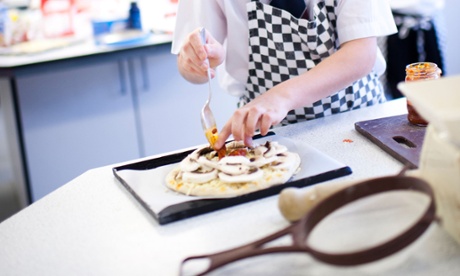
Teenagers studying for a new GCSE in food preparation will have to know how to portion a chicken, fillet a fish and julienne vegetables, as well as make a variety of sauces from hollandaise and mayonnaise to veloute, bechamel and plain old gravy.
The rigorous new examination for 16-year-olds will require them to be able to tenderise, marinate, blanch, poach, fry and braise – as well as make their own pasta, choux pastry, bread and tagine.
They will have to understand the difference between their jus and their roux, as well as the finer details of palmiers, batons, dextrinisation and gas-in-air foam.
The impressive array of skills is just one element of the tough new GCSE in food preparation and nutrition, which also covers the relationship between diet, nutrition and health, and the impact of a poor diet.
Pupils have to learn about food provenance, British and international culinary traditions, food security, food labelling and food poisoning. Other topics include how to calculate energy and nutrition values, planning meals, and diet-related health risks such as obesity, diabetes and heart disease.
And on top of the sophisticated knife skills required for meat and fish preparation, students will also have to learn how to mash, shred, scissor snip, scoop, crush, de-skin, de-seed, pipe, blend, juice and prepare garnishes.
The new exam was welcomed by chefs who were impressed by the rigour of the course content. Chef, food writer and campaigner Hugh Fearnley-Whittingstall said he would be very happy for any of his children take the GCSE. “It looks very strong and well thought out. Quite demanding, but in a good way. It raises issues of provenance and flavour as well as health and nutrition.
“It’s anchored in the world of real food and real cooking, rather than nebulous notions of ‘food tech’ and spurious ‘product design’. It’s sensibly directed towards food careers that involve actual cooking.”
Half the GCSE, which will be taught from next year, will be assessed by exam, and the rest will be practical, with the aim of teaching pupils about the scientific principles underlying the preparation and cooking of food.
Concerns were raised during the government consultation on the new qualification that the course would be too demanding for teenagers and that standard one-hour lessons were not long enough to cover the skills required. But Nicole Pisani, who was head chef at top London restaurant Nopi before taking up a job in a school kitchen this year, welcomed it. “On first glance, it is extremely thorough, and I like that there is emphasis on provenance and the environment.
“It’s amazing if they manage to do all this stuff. I trained in Malta and we didn’t have all this. They learn how to do everything! They can all be chefs after this. I was thinking maybe I should do it myself.”
Yotam Ottolenghi said the exam seemed comprehensive. “I am quite impressed with the level of theoretical knowledge required and the technical skills. Making choux pastry, for example, isn’t something I’d necessarily expect to see there.”
Myles Bremner, of the Independent School Food Plan, which aims to improve food in England’s schools, was also enthusiastic about the new exam: “This qualification is another big step forward for food education in this country following the introduction of cooking as compulsory in the curriculum this term for all children up to the age of 14.
“I particularly like the new emphasis on understanding and enjoying English and international cuisines and encouraging students to develop their own recipes.”
The food GCSE was one of four new qualifications unveiled by the government on Thursday. Details of new GCSEs in citizenship studies, drama, and religious studies (RS) were also published, along with the content of new A-levels in RS and drama.
The content of the new RS GCSE has been contentious because of concerns that it would not include a non-religious world view. It has now been confirmed that pupils will study two religions out of Buddhism, Christianity, Catholic Christianity, Islam, Hinduism, Judaism and Sikhism in the first half of their course. They can then choose whether to go on to study one or both of those faiths in greater depth through a variety of themes.
A DfE spokesman said: “The new GCSE content requires students to have an understanding of the beliefs, teachings and practices of two religions, but still allows them to spend up to 50% of the course studying philosophy and ethics, which can include studying other non-religious beliefs such as humanism, alongside the core study of major world religions.”
Andrew Copson, chief executive of the British Humanist Association, said: “While we welcome the more inclusive nature of some aspects of the revised qualifications, we are bitterly disappointed that humanism is to be largely excluded. With each generation being less religious than the previous one, it is vital that humanism be included, and there is barely anyone apart from the Conservative part of the coalition government that disagrees.”

